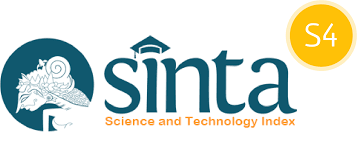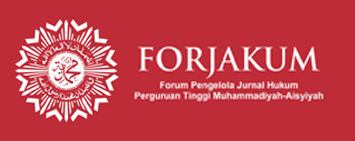Upaya Hukum Pemenuhan Hak Penyandang Disabilitas Selama Masa Pandemi Covid 19
DOI:
https://doi.org/10.18196/mls.v3i4.15843Keywords:
disabilities, government, legal protectionAbstract
The COVID-19 pandemic threatens all humans in the world. Many people died due to the plague of the world that has not disappeared yet from human civilization. Ministry of Social Affairs in 2021 through the Management Information System for Persons with Disabilities as of January 13, 2021, there were 209,604 persons with disabilities in Indonesia. This figure is a reference that there are quite a lot of people with disabilities that need to be considered with a large number of people with disabilities. Persons with disabilities are a group that is vulnerable to today's conditions, the spread of the COVID-19 pandemic in Indonesia. This research aims to determine the government's legal responsibility for persons with disabilities during the COVID-19 pandemic in Indonesia through regulations and legal remedies for handling them. This research uses the juridical-normative method and the conceptual approach and the statute Approach. The results of this study reveal that Persons with Disabilities have a right to health that cannot be reduced and requires the presence of the government to protect fundamental rights, that is the right to health which is included in human rights that have been stated in the laws and regulations in Indonesia. The fulfillment of rights for persons with disabilities during the COVID-19 pandemic has not been fully regulated and implemented by the government. It has been proven in several cases that there is discrimination against persons with disabilities in obtaining easy access and protection during the COVID-19 pandemicReferences
Adi (ed). Dikbud NTB Terapkan Pembelajaran Guru Kunjung-Fasilitasi Pembelajaran untuk Siswa Pinggiran. Portal Berita Harian Radar Lombok. 2020. Diakses dari https://radarlombok.co.id/dikbud-ntb-terapkan-pembelajaran-guru-kunjung.html
Adriano. Pemikiran dan Teknik Pembuatan Putusan Pemidanaan Terhadap Korporasi. Bandung: Mandar Maju, 2016.
Akhyar, Wira Iqomudin, Gunawan, Haris Widiasmoro, and Layla Izza Rufaida. “Kebijakan Bantuan Pangan Non Tunai Dalam Perspektif Filsafat Hukum Murni.” Jurnal Reformasi Hukum 25, no. 1 (2021): 41–56. https://doi.org/10.46257/jrh.v25i1.189
Ariadi, Dwi. Bincang Kreatif, Disabilitas Kabupaten Tegal Rambah E-Market. Ayo Tegal, 2022. https://tegal.ayoindonesia.com/slawi/pr-34458940/BINCANG-KREATIF-Disabilitas-Kabupaten-Tegal-Rambah-EMarket
Attamimi, A. Hamid S. Teori Perundang-undangan Indonesia (Suatu Sisi Ilmu Pengetahuan Perundang-Undangan Indonesia yang Menjelaskan dan Menjernihkan Pemahaman). UI Press, 1992.
Aulia, F., Dessy Hasanah Siti Asiah, and Maulana Irfan. “Peran Pemerintah Dalam Penanganan Dampak Pandemi Covid-19 Bagi Penyandang Disabilitas.” Jurnal Penelitian dan Pengabdian Kepada Masyarakat (JPPM) 1, no. 1 (2020): 31–41. https://doi.org/10.24198/jppm.v1i1.30951
Azhari. Pancasila dan UUD 1945. Jakarta: Ghalia Indonesia, 1982.
Bagus, Prasetio, Rizki. “Pandemi Covid-19: Perspektif Hukum Tata Negara Darurat dan Perlindungan HAM.” Jurnal Ilmiah Kebijakan Hukum 15, no. 2 (2021): 327–346. https://doi.org/10.30641/kebijakan.2021.V15.327-346
Budiman, Arief. Teori Negara: Negara, Kekuasaan dan Ideologi. Yogyakarta: Pustaka Utama, 1996.
Hadjon, Philipus M. Perlindungan Hukum Bagi Rakyat Indonesia. Surabaya: Bina Ilmu, 1987.
Kemenpppa. Panduan Perlindungan Khusus dan Lebih Bagi Perempuan Penyandang Disabilitas Dalam Situasi Pandemi Covid-19. Deputi Bidang Perlindungan Hak Perempuan, Kementerian Pemberdayaan Perempuan Dan Perlindungan Anak R.I., 2020.
Kurniawan, Muhammad Beni. “Politik Hukum Pemerintah dalam Penanganan Pandemi Covid-19 Ditinjau dari Perspektif Hak Asasi atas Kesehatan.” Jurnal HAM 12, no. 1 (2021): 37–56. https://doi.org/10.30641/ham.2021.12.37-56
MaPPI. Panduan Penanganan Perkara Penyandang Disabilitas Berhadapan Dengan Hukum. Fakultas Hukum UI, 2019.
Marzuki, Peter Mahmud. Penelitian Hukum. Jakarta: Kencana Prenada Media Group, 2005.
Matompo, Osgar S., Muliadi, & Andi Nurul Isnawidiawinarti Achmad. Hukum dan Hak Asasi Manusia. Malang: Setara Press, 2018.
Millati, Sofiana. “Social-Relational Model dalam Undang-undang Penyandang Disabilitas.” Inklusi 3, no. 2 (2016), 285–304. https://doi.org/10.14421/ijds.030207
Minarno, Nur Basuki. Penyalahgunaan Wewenang dalam pengelolaan Keuangan Daerah yang Berimplikasi Tindak Pidana Korupsi. Surabaya: Laksbang Mediatama, 2009.
Nurhik02. Respon Pemerintah Indonesia dalam Memenuhi Hak Penyandang Disabilitas Selama Pandemi Covid-19. AIDRAN, 2020. https://aidran.org/respon-pemerintah-indonesia-dalam-memenuhi-hak-penyandang-disabilitas-selama-pandemi-covid-19/
Nursyamsi, Fajri, Estu Dyah Arifianti, Muhammad Faiz Aziz, Putri Bilqish, and Abi Marutama. Kerangka Hukum Disabilitas di Indonesia: Menuju Indonesia Ramah Disabilitas. Pusat Studi Hukum dan Kebijakan Indonesia, 2015.
Nursyamsi, Fajri. Komisi Nasional Disabilitas untuk Siapa? Hukum online, 2022. Diakses https://www.hukumonline.com/berita/a/komisi-nasional-disabilitas-untuk-siapa-lt5e438acb995c3
Parwanto, M. L. E. “Virus Corona (2019-nCoV) penyebab COVID-19.” Jurnal Biomedika dan Kesehatan 3, no. 1 (2020): 1–2. https://doi.org/10.18051/JBiomedKes.2020.v3.1-2
Pramesti, Tri Jata Ayu. Mau Melaporkan Tindak Pidana ke Polisi? Begini Prosedurnya - Klinik Hukumonline. hukumonline.com. 2020. Diakses 1 Januari 2022, dari https://www.hukumonline.com/klinik/a/mau-melaporkan-tindak-pidana-ke-polisi-begini-prosedurnya-lt504d52481c208
Purbacaraka, Purnadi, and Soerjono Soekanto. Perihal Kaedah Hukum. Bandung: Citra Aditya Bakti, 1978.
Purwadi, M. “Penguatan Akses Hukum dan Keadilan.” Majalah Komisi Yudisial, 2018. Diakses dari https://www.komisiyudisial.go.id/storage/assets/uploads/files/Majalah-KY-April-Juni-2018.pdf
Rahayu, Sugi, Utami Dewi, and Marita Ahdiyana. “Pelayanan Publik Bidang Transportasi bagi Difabel di Daerah Istimewa Yogyakarta.” SOCIA: Jurnal Ilmu-Ilmu Sosial 10, no. 2 (2013). https://doi.org/10.21831/socia.v10i2.5347
Smith, Rhona K.M., Njäl Høstmælingen, Christian Ranheim, Satya Arinanto, Fajrul Falaakh, Enny Soeprapto, Ifdhal Kasim, Rudi M. Rizki, Suparman Marzuki, Fadillah Agus, Agung Yudhawiranata, Andrey Sudjatmoko, Antonio Pradjasto, Sri Wiyanti Eddyono, and Eko Riyadi. (Ed. Knut D. Asplund, Suparman Marzuki , and Eko Riyadi). (2008). Hukum Hak Asasi Manusia. Yogyakarta: Pusat Studi Hak Asasi Manusia UII, 2008.
Soekanto, Soerjono, and Sri Mamudji. Penelitian Hukum Normatif: Suatu Tinjauan Singkat. Jakarta: Rajawali Press, 2006.
Tahamata, Yuniati Maryana. “Optimalisasi Bimbingan Klien Pemasyarakatan Pada Masa Pandemi Covid-19 di Balai Pemasyarakatan (Studi di Balai Pemasyarakatan Kelas I Jakarta Selatan).” Reformasi Hukum. 25, no. 2 (2021). https://doi.org/10.46257/jrh.v25i2.195https://doi.org/10.21831/socia.v10i2.5347
Widodo, Bambang. “Pendidikan Inklusi dan Peluang Kerja Penyandang Disabilitas.” Mediasi: Majalah Hak Asasi Manusia – Mengangkat Harkat dan Martabat Insani 19, no. 1 (2019). Diakses dari https://ham.go.id/book/majalah-mediasi-ham-19-no-1/
Wojowasito, S. Kamus Umum Bahasa Belanda-Indonesia. Jakarta: Ichtar Baru van Hoeven, 1996.
Downloads
Published
Issue
Section
License
Copyright
Authors who publish papers in this journal agree to the following terms:
Authors retain copyright. Authors are permitted to copy and redistribute the journal's published version of the work non-commercially (e.g., post it to an institutional repository or publish it in a book)
Authors are permitted and encouraged to post their work online (e.g., in institutional repositories or on their website) prior to and during the submission process, as it can lead to productive exchanges, as well as earlier and greater citation of published work (See The Effect of Open Access).
This journal is using Attribution-NonCommercial-ShareAlike 4.0 International. You are free to:
- Share — copy and redistribute the material in any medium or format
- Adapt — remix, transform, and build upon the material
The licensor cannot revoke these freedoms as long as you follow the license terms, which include the following:
- Attribution — You must give appropriate credit, provide a link to the license, and indicate if changes were made. You may do so in any reasonable manner, but not in any way that suggests the licensor endorses you or your use.
- NonCommercial — You may not use the material for commercial purposes.
- ShareAlike — If you remix, transform, or build upon the material, you must distribute your contributions under the same license as the original.
- No additional restrictions — You may not apply legal terms or technological measures that legally restrict others from doing anything the license permits.
Creative Commons Attribution-NonCommercial-ShareAlike (CC BY-NC-SA)

This work is licensed under a Creative Commons Attribution-NonCommercial-ShareAlike 4.0 International License.



